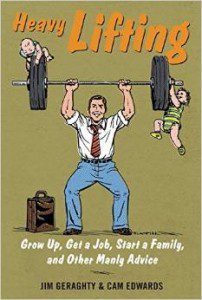If a certain kind of book must be written and read, a warning should flash that is more authentic than any “blood moon prophecy.” The fact that it must be written is a bad sign. Jim Geraghty and Cam Edwards have a book full of the kind of advice my Uncle Roddy and my dad gave me for free. Yet I teach enough young adults a year to know the obvious is no longer obvious and that the dads and uncles have quit doing their job: students haven’t been given any of the “talks” that I could take for granted.
This is sad. Geraghty and Edwards are forced to do what my dad, papaws, numerous uncles (the heroic Uncle Bob!) did all the time. Meet my Uncle Charlie and you saw a man living a man’s life. Did anyone ever tell my Uncle Bill he had to work hard to make a living?
Yet this book must be written because too few good men are out teaching these lessons. A mass market paperback must do the work that my generation failed to do. God help us.
What if you saw many American men refusing to grow up while growing old? What if you wanted to advocate for some traditional American values while reaching as many Americans as possible? If you make a religious argument, you narrow down your audience and such books are already in print. There are millions of younger men who would never read a book that sounded like a sermon was coming.
Geraghty and Edwards have attempted to write for as many American men as possible. They cajole, bribe, and urge the reader to grow up, get a job, and start a family. They cajole by showing the need for men in the nation, they bribe by arguing that manliness brings happiness, and they are persuasive because they seem like great men to know.
I want to buy them both a manly beverage and have a manly discussion with them.
This book contains truths that should not be controversial, but will be. The authors know Americans distrust anyone saying something “fun” is wrong or anyone who tells them to do something that is unpleasant. As a result, they tread carefully. They know that grown men with real jobs, good marriages, and kids don’t have much time for kids’ games, but are careful not to make any blanket statements about forms of entertainment.
Edwards and Geraghty are mostly successful in selling the ancient virtue of all gentleman: moderation.
Geraghty is far and away the better writer, the anecdotes are uneven in terms of literary merit, but all the prose is serviceable. The text has some laugh out loud moments and rarely made me cringe. Edwards has the more interesting personal and family story and he is quite moving as he argues that an adult life, even an imperfect adult life, is better than perpetual childhood.
I loved the open embrace of marriage and child bearing. The defense of the role of father was excellent. The warnings about what not to do when you are expecting would have saved me some bad moments in the birthing room.
This book is worth reading, might help many people, and start more than one hot debate. Go forth and purchase.
And now the writers might wish to stop reading this review, for I have a nagging worry about the book.
This is a book of social conservatism, a social conservatism that conserves much that is good in the America of the 1950’s. Ward Cleaver is the hero who appears at the end of every chapter, without the bits we (sort of) know were bad about the 1950’s. I was never sure on what basis some things (“marriage”) from the 1950’s are good, while other things (views on sexuality or gender roles) are not good. I began to suspect that “college educated readers might listen” was one good way of drawing the line . . . Geraghty and Ward argue for things like hard work and not whining. These are values that have faded for many, but are still not so far from the mainstream to be loathed.
Geraghty and Ward will tell you to go to work, but to be sexually abstinent outside of marriage. One suspects a 1950’s conservative like William F. Buckley would said: “Go to church.” Geraghty and Ward do not tell you not to go, but I am not sure large numbers of secular men are going to heed their advice. The secular man has been morally gelded and they are asking him to be fruitful. Good luck.
If Ward Cleaver had lived in 2015, he evidently would look a great deal like Jim Geraghty and Cam Edwards. Maybe. Or maybe he would have seen them (and me) as clinging to pieces of his lifestyle, but not other parts that mattered. The late Professor Sheldon Vanauken argued that there was “no home without a homemaker” (husband or wife) and Ward Cleaver would have agreed, but Geraghty and Edwards will not go so far.
The book cheats a bit, because though it is moralistic, it carefully skirts any basis for moral pronouncements. Wit in service of wisdom covers mostly for the missing moral underpinnings, but the inconsistency is there. At times, we are urged to live the good life because it is better, more “fun,” and will make us “happier.” Other times we are told that we should do unpleasant, not so awesome, less fun things because they are the duty of men and society needs them.
All of this is the worry of an older man with grownup children . . . not the target of their book. Buy it. Give it to the man who needs to read it. The advice in it is (mostly) very sound and it can only help. If it starts a good discussion, all the better.











